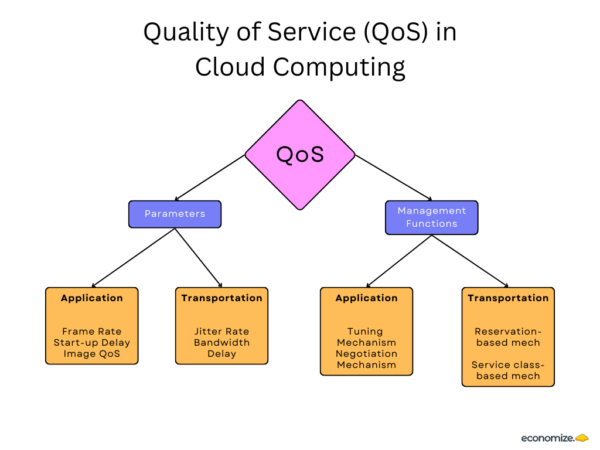Brief Overview of QoS (Quality of Service)
Quality of Service (QoS) refers to the capability of a network to provide different priority levels to different types of data traffic, ensuring a certain level of performance, reliability, and availability. In the context of Virtual Private Networks (VPNs), QoS plays a crucial role in maintaining a satisfactory user experience by managing bandwidth usage efficiently.
Detailed Explanation of QoS (Quality of Service)
In the realm of networking, QoS encompasses various techniques and mechanisms designed to optimize the transmission of data across networks. These techniques include packet prioritization, traffic shaping, congestion management, and resource reservation. By implementing QoS, network administrators can allocate network resources judiciously, prioritize critical applications, and mitigate latency and packet loss issues.
Key Features of QoS (Quality of Service)
- Packet Prioritization: Assigning different priority levels to packets based on predefined criteria such as application type, source, destination, or service level agreements (SLAs).
- Traffic Shaping: Regulating the flow of data traffic to ensure that it conforms to specified parameters, such as bandwidth limits or delay thresholds.
- Congestion Management: Employing algorithms and mechanisms to manage network congestion and prevent performance degradation during periods of high traffic.
- Resource Reservation: Reserving network resources in advance to guarantee adequate bandwidth and minimize the risk of contention.
Types of QoS (Quality of Service)
QoS can be classified into several types based on the specific aspects of network performance they address:
| Type of QoS | Description |
|---|---|
| Best Effort | Default mode of operation where all traffic is treated equally without any prioritization. |
| Integrated Services (IntServ) | Provides end-to-end QoS guarantees by reserving network resources for individual flows. |
| Differentiated Services (DiffServ) | Classifies and prioritizes traffic based on predefined service levels, allowing for scalable QoS implementations. |
| Traffic Engineering | Optimizes network utilization and performance by dynamically adjusting traffic paths and resource allocations. |
Uses of QoS (Quality of Service)
- VoIP and Video Conferencing: Ensuring real-time communication applications receive sufficient bandwidth and low latency to maintain audio and video quality.
- Streaming Media: Prioritizing streaming traffic to prevent buffering and deliver uninterrupted playback experiences.
- Online Gaming: Minimizing latency and packet loss to enhance responsiveness and competitiveness in online gaming environments.
- Business Critical Applications: Guaranteeing reliable access to mission-critical enterprise applications such as ERP systems and customer relationship management (CRM) platforms.
Challenges and Solutions with QoS (Quality of Service)
Challenges:
- Complexity: Implementing QoS mechanisms can be complex, requiring careful configuration and management.
- Overhead: QoS introduces additional overhead in terms of processing power and network resources.
- Dynamic Environments: Adapting QoS policies to changing network conditions and traffic patterns can be challenging.
Solutions:
- Automation: Leveraging automation tools and intelligent algorithms to simplify QoS provisioning and management.
- Scalability: Implementing scalable QoS architectures that can accommodate growing network demands and evolving technologies.
- Monitoring and Analysis: Utilizing network monitoring and analysis tools to identify performance bottlenecks and optimize QoS configurations proactively.
Characteristics and Comparisons
| Characteristic | Quality of Service (QoS) | Traffic Management |
|---|---|---|
| Objective | Optimize network performance and resource utilization. | Manage and control data traffic flow within the network. |
| Scope | Encompasses a broad range of techniques and mechanisms. | Focuses specifically on regulating traffic patterns and behaviors. |
| Implementation | Implemented at various network layers, from application to physical. | Primarily operates at the network and transport layers. |
| Flexibility | Offers flexible configuration options to tailor QoS policies to specific requirements. | Provides predefined traffic management rules and policies. |
Future Perspectives and Technologies
As network technologies continue to evolve, the future of QoS lies in the integration of artificial intelligence (AI) and machine learning (ML) algorithms for dynamic traffic management and optimization. Software-defined networking (SDN) and network function virtualization (NFV) will also play a significant role in enabling agile and adaptable QoS implementations.
VPN and QoS (Quality of Service)
VPN services can benefit from QoS mechanisms by ensuring reliable and consistent performance for users accessing network resources over VPN connections. By prioritizing VPN traffic and applying QoS policies at the VPN gateway, service providers can deliver enhanced quality of service for applications and services accessed via VPN, such as VoIP, video conferencing, and cloud-based applications.
Resources for Further Information
- Cisco – Quality of Service (QoS)
- Juniper Networks – Understanding Quality of Service (QoS)
- IEEE Communications Society – QoS Management
This comprehensive guide provides insights into the principles, implementations, and applications of Quality of Service (QoS) in networking environments, shedding light on its significance in optimizing network performance and user experience.


